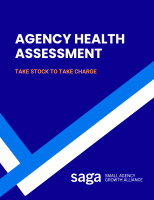Do you know what you really want from your agency business? Have you been honest with yourself about how much you want to work and earn? How about the type of team and clients that you want to be surrounded by?
The AIM-GET Framework for Agency Success starts with defining your own Ambition as the agency owner.
There is no reason to take on all of the risk and stress of owning and operating your own business if you are not able to get what you want from it.
If you are not clear with yourself about what you want to achieve, you cannot make important strategic and tactical decisions that will make it more likely for you to reach those goals.
You need to be honest with yourself as you work through the questions suggested below. Don’t develop the definition of Ambition that you think you are “supposed” to have. Make choices that are right for you.
Defining your Ambition is something that I suggest you review annually because what’s going on in your life and the knowledge that you gain over time may influence you to make some changes to the goals that you have.
As you make important decisions for your agency, you need to make sure that you keep your own definition of Ambition in mind and ask yourself if that decision makes it more or less likely that you will achieve what you want.
Your definition of Ambition can include anything you want, but here are a few suggested questions to help you get started with the exercise.
How much do you need/want to make?
Many agency owners simply set out to generate as much business as they can and then look at the amount of money that they have in their bank accounts to pay themselves.
That’s no way to run any business, but especially the business that you are building to provide for your own livelihood (and likely retirement).
You should be clear with yourself about what your minimum compensation requirements are from your business. That’s a number that you should strive never to go below.
If you know your minimum, it helps you test your projections and budgets against the reality of what you need to earn.
If your business can’t help you hit your minimum requirements without extraordinary effort (or luck) then you need to reevaluate your model, pricing, or some other aspect to help you get where you need to be.
But knowing your minimum isn’t quite enough. You also need to understand what you would like to be making out of your business to provide for your dreams, both in the near future and over the longer term.
Knowing these numbers allows you to scale intelligently and price appropriately.
It also enables you to take comfort in knowing that you will be in a position to provide for your wants and needs – something that is vitally important to putting you in the right frame of mind to make important strategic and management decisions for your agency.
Finally, you should always keep these numbers in mind, especially when the business is doing particularly well or confronting a rough patch.
Often owners will sacrifice their own financial need for the “good of the team,” but the reality is that once your business stops meeting your financial requirements it will feel more like a burden than a worthy adventure.
How much do you want to work?
I don’t know many agency owners that feel like they work too few hours. Most feel overworked.
The only way to get control over the amount of time you spend working on and in your business is to be honest with yourself about how much time you would like to work.
With that knowledge, you can formulate a plan to transition from your current state of overwork to something more comfortable that makes you happy to own the agency.
As important as the raw number of hours is when you want those hours to fall. That question gives you clear insight into the kind of projects and clients that you take on.
It is important to know that there are no right or wrong answers about the amount of time – and when – you want to work.
Your ambition about the amount of work may shift over time, as well, especially as events in your personal life impact the demands on your schedule outside of the office.
You should also be comfortable outlining an ideal schedule that gives you the time and space for the leisure activities that you enjoy. We all say life is short, but we often fail to take the steps within our own businesses to allow us to enjoy the time we do have.
For instance, you might want to keep Fridays clear to go skiing or golfing. That’s a legitimate – and often achievable – goal that you can use to shape your business decisions.
Ultimately, you need to clearly define your workload ambition so that you are more likely to feel satisfied with your decision to work for yourself (and the clients you choose).
How do you feel about risk?
As a business owner, you need to be comfortable with some level of risk. Sure, there is risk in being someone else’s employee, but there are more things that can go wrong when you are in business for yourself.
That doesn’t mean that you need to be prepared to be a swashbuckling entrepreneur before you decide to take the plunge and start your own agency.
There is a continuum of risk that you need to decide where you fall in order to help guide your decision-making process.
One of the biggest hurdles that many agency owners need to decide how to handle is whether or not to have payroll employees in the business.
Hiring that first full- or part-time worker is a big decision and one that most agency owners don’t take lightly.
That’s because you are now shouldering the risk not only for yourself and your loved ones, but also those of another individual and family.
Your stomach for risk also impacts decisions that you may make to raise prices, fire troublesome clients, and launch new service lines.
As with most of the questions on this list, there is no right or wrong answer to how much risk you are willing to take.
And as with many of them, your answers may shift over time. If you’re young and single there’s a good chance that you are willing to take more risks than if you have teenagers with the possibility of college beckoning in a few years.
It is important for you to give the question of risk some serious contemplation and to be honest with yourself so that you don’t find yourself out on a limb on a tree that you never really wanted to climb.
What type of work do you want to do?
If you’re the boss, you should decide what work that you want to do each day.
Clients often push back when I say this. They argue that there are things that they do because there is nobody else to do it, they can’t afford the help, or others (often clients) expect them to be involved in a particular task.
In most cases, these arguments simply aren’t valid.
Clients usually don’t care who does a certain piece of work as long as it meets their expectations for results.
If you can’t afford help, then you aren’t pricing your services correctly.
If you have nobody on your team who can do something that you don’t want to do yourself, then hire them. And if you can’t afford it, see above.
Sure, there are some things that only you as the agency owner can do. But those are few and far between.
And none of this means that you get to abdicate ultimate responsibility for everything that goes on with your business. The buck still stops with you.
But you have the ability to design your day the way you want, not just in terms of the amount of work that you do but also in the form of the type of tasks that you personally perform.
Map out your ideal day as part of the Ambition process and then come up with a plan to achieve it.
How important is flexibility to you?
We have discussed how much you want to work and what you want to do with your time, but you also need to consider how important flexibility is to you.
You can define flexibility however you want, and for the purposes of this exercise you should be considering it in every way that you envision it.
For example, how do you feel about being on-call for clients? That answer helps you decide how much you want to be involved in services that require off-hours access, like crisis communications or website hosting and maintenance.
Do you want to be able to travel around easily while continuing to work? Then you need to make sure that you are not structuring a business that would impair this ability by requiring frequent in-person meetings or the use of fixed infrastructure in your own office.
How about the ability to take time off regularly? Perhaps you want to be able to take family trips a few times a year and spend the month of August renting a house in the countryside.
Those are all fine aims and can certainly be part of your Ambition.
In fact, if that is what will make you happy, then you should absolutely include it as part of your personal definition of success.
Knowing what you want will enable you to make important decisions about the structure of your team, the type of services you offer, and the kinds of clients you pursue.
Who do you want to work with?
One thing that many agency owners overlook in their planning process is that they get to decide what kind of team that they want to hire and work with.
Sure, you may understand that you are the ultimate hiring authority, but usually the decision about the roles to hire comes out of necessity rather than careful pre-planning.
Are you looking to put together a senior team of practitioners that are your equals and can go toe-to-toe with you on key questions?
Would you prefer to cultivate a younger, less experienced team that you can mentor and mold?
Perhaps you would like some variety, not just in experience levels but perhaps in cultural backgrounds or even nationalities.
You will be working with your team members every day for as long as they remain employed and you remain the owner, so you don’t want to create a workforce that you don’t enjoy being around.
How you decide to structure your team and the types of people you want to hire has a significant impact on the types of engagements that you take on and how you price them.
A team of all senior people must charge higher rates to thrive than an agency that builds on less costly labor – but the type of work is necessarily different, too, because senior practitioners won’t want to (and shouldn’t) be doing lower-level work and more junior team members may not yet be ready for more significant contributions.
Don’t let inertia dictate your talent plan – set out to build the team you want to work alongside.
Where do you want to live?
More agency owners (and their employees) are choosing to live in non-traditional locations.
In many cases, clients don’t care where the agency or its team members are physically located as long as the work gets done at a level that satisfies their expectations.
This is even true now with agencies that serve a particular geographic area. It is now not uncommon for an agency owner of a regional agency to live outside of that region (at least most of the time).
While you have a lot of flexibility in choosing where you want to live while you build your agency, there are implications for that decision.
For example, if you choose to live somewhere that is convenient to an airport, your ability to travel to in-person engagements is considerably more practical. If you are very remote, you may want to avoid client engagements or other activities that will put you on the road for significant amounts of time.
Similarly, you probably don’t want to invest a lot of money in an office in a location that you don’t expect to frequent. You may want to use co-working space or other solutions for team members who want an office rather than a traditional suite in a commercial building.
Another key consideration is time zones. While you can have clients anywhere in the world these days with the ease of services like Zoom, you need to think about how it impacts your personal schedule if there is a significant time difference between you and your client.
Remember that you are the one who will likely need to accommodate the client’s preferred working hours rather than the other way around, so you will likely want to try to focus on business closer to your home’s time zone.
Time zones also have implications for the people that you hire. Just as you can live anywhere, you can hire people from anywhere. But if you are on substantially different schedules, that can be inconvenient for one or both of you. Of course, many agency employees now prefer to work non-traditional hours even in the same time zone as you, so this often ends up being more of a 1:1 discussion between you and your potential team member.
Think about where you want to live not just today, but in the next few years. If you are approaching a significant life event – marriage, empty nest, retirement, etc. – then you may want to move somewhere and the sooner you start planning for that goal, the easier it will be to achieve without disrupting your business or delaying your personal plans.
How much do you want to travel?
Some agency owners are on the road for large chunks of the year, meeting clients, attending conferences, and engaging in other business activities.
Others prefer to be closer to home, able to spend more time with their families and avoiding all of the challenges that frequent business travel entails.
Personally, I have done everything from being on the road more than half the time to rarely leaving my own zip code. You need to decide what’s right for you (and, again, this may evolve for you over time).
If your Ambition is to avoid travel, you probably don’t want to use major conferences as your primary Growth activity (unless you live in a big city like Las Vegas or New York where many of the events come to you).
On the other hand, if you thrive on getting on an airplane, then you may want to develop an Identity for your agency that gives you an excuse to travel the world.
You won’t need to let the work dictate your travel plans if you are clear about your desire and then build the business around it.
What is your exit plan?
You won’t own your agency forever. One way or another you will be exiting that role someday.
But you should decide how you would like to draw your time as the owner to a close.
You could sell to a third party, transfer to a family member, transition to employee owners, close the doors and walk away, hang on until you leave toes-up, or any number of other scenarios that you can envision.
This is the area of your Ambition planning that probably demands the most research and thought. It’s not something that you can simply choose based on your own whim (like deciding where to live or how much time you want to invest in the business).
Instead, you need to really understand what’s involved with the different exit options in order to map out a plan that makes your idea more likely than not to succeed.
Unlike some of the other questions you are considering as part of this exercise, you don’t fully control the exit plan. Many aspects remain out of your control, but you can take steps to influence the outcome.
For example, you can’t force a third party to buy your firm, but you can certainly better position it and manage it to make it more appealing to potential acquirers.
Similarly, you may want a family member or employee to take over the business one day, but that doesn’t mean that they are interested in or have the ability to do that themselves.
Exit planning isn’t an overnight process. If you have a preferred outcome, then you don’t want to wait until a year away from that date to start getting busy with activity.
Selling the agency to an employee or third party, for example, typically requires 3-4 years of proper planning to maximize the potential for success. And if you sell to a third party, you probably have at least 2-3 years (and possibly more) that you will spend working for the buyer in a typical deal.
If you don’t want to sell your agency, there are other ways to extract value from the business as an asset and not just a paycheck. For example, you can maximize your profit draws over time and invest those funds in other vehicles like the stock market or real estate to build a nest egg.
While some may deride that approach as a “lifestyle business” there is nothing inherently wrong with it and many agency owners build a bigger pile of retirement cash by harvesting ongoing profits than by collecting a payday upon selling the business.
The bottom line is that you should carefully consider the options and map out a path because how you want to exit has a substantial impact on the decisions you will make about how you structure and operate your agency for years to come.
What recognition do you want?
Most business owners have some degree of ego. After all, it is difficult to take the step of shouldering the risk and responsibility of running your own business without enough belief in your own ability to succeed.
But part of your Ambition planning should be to consider how much the recognition of others matters to you as you build your agency.
Do you care about industry awards? Not as a business development tactic – that’s a conversation for another day – but for your own measurement of your personal success?
Do you need those trophies in a case or on the wall to know that you succeeded? Or are you happy to register your own satisfaction (and your bank account balance) as an indication that you have made it as a business owner?
How about revenue or headcount goals? Do you need to have a $1 million or $10 million business to feel like you have been successful? Are the bragging rights about having 10, 20, 30 employees (or more) important?
Do you want to attain certain roles in your community, perhaps as part of a nonprofit board or elected office? How does the agency fit into your ability to hit those goals and feel like you are making a difference?
If you have specific mileposts in mind that you want to achieve, you should include them in your Ambition goals. If we work together, I might push back on some of them to make sure that you really understand their impact (for example, many $10 million agencies put less money in the pockets of their owners than their $1 million counterparts).
Ultimately, the decision is yours, however, and you can shape the agency to help you meet these goals.
How does legacy impact your goals?
The legacy you leave behind after you complete your time as an agency owner may or may not be important to you.
Some agency owners are happy to have been successful (by their own definition) and then move on to their next stage of life.
Others value the fact that they built something that will continue to employ people, serve clients, and otherwise prosper long after their name is no longer on the company documents.
Some of your own legacy preferences may be met through the recognition you desire that is noted above.
But other aspects may be separate from that public recognition and could be reflected in a desire to keep the agency in the family or try to ensure that your name stays on the door (to the degree you can) even after you are gone.
Obviously, it is difficult for any of us to truly control the legacy we leave but we can shape a business that is more likely to help contribute in the way we would like.
The legacy you desire plays an especially important role in exit planning and can make it easier or more difficult to achieve depending on those preferences.
Building a legacy of any kind takes time, so the more aware of it you are early on in your time as an agency owner, the more likely you are to reach your goals.
What else do you want from owning your business?
The list of questions provided here is by no means exhaustive, but it is designed to get you thinking seriously about your Ambition as an agency owner and how you can begin to ensure that your business helps you reach your goals.
If you don’t know what you want from your business, then inertia will guide you and prevent you from building an Intentional Agency that will help you achieve the success you desire, both now and in the future.
You should be asking yourself if there are other things not discussed here that you want from your time as an entrepreneur. You should assume that everything you want to achieve outside of work can be influenced in some fashion by how you decide to run your business.
I encourage you to discuss your Ambition with trusted friends and family who can help you think about what you really want. Take time outside of the office when you are able to clear your head and focus on what makes you happy now and what you want to be doing down the road.
Put these goals down on paper and then review them annually. Ask yourself these key questions each year to see how your Ambition is evolving as you learn more, as your life changes, and you gain a fresh perspective.
The Ambition you define will help you make the critical strategic and tactical decisions needed to successfully advance your agency to the next level – however you define that for yourself.










